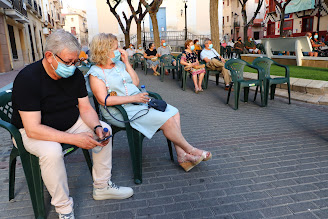So far as I know I have no chronic illnesses though I know from people around me that your luck can change in seconds. I do often feel old though. Old as I feel the pain in my knees. Old as I realise that I'm gasping for breath after climbing a few stairs. Old as my arms ache after a bit of sawing. My feet hurt all the time, and the tinnitus is really loud. And so on and so forth. I'm getting old. No, let's be right about it, I am old. I know that people around me refer to 45 year olds as middle aged but all I can suppose is that they failed their "O" level sums.
Covid, and the responses to it, have kept us all quite hemmed in for a while now. Of course it has done much more. It has killed people, destroyed businesses, overpowered health services, left people penniless, challenged basic democratic rights and much more but, in our case, it has mainly hemmed us in. Lots of normal activity has stopped. Spain, a country where the smallest centre of population has a fiesta to celebrate its patron saint has cancelled them all. Covid is going to do to Christmas what the Grinch failed to do.
On the cultural side the few concerts and sports events that have found a way to continue have been severely limited or have no spectators. In like manner the big museums may still be putting on new exhibitions but the the visitor numbers are scandalously low. Book fairs have been cancelled left right and centre. It's true that he cinemas are open but there are almost no big budget Hollywood films to see and even the domestic releases have been scant. Who wants to waste all that effort in releasing their film for paltry attendances? Of the five cinemas we most usually go to one has closed, probably for good, and one is running on a five day week. Current travel restrictions mean we can't use three of them; they are out of bounds. I went to a 4.15pm film screening last Wednesday and I was the only person, in the whole of the 11 screen cinema, apart from staff. Last night we went to a theatre in Elche and there were six of us in the dress circle. Down in the stalls half of the seats were taped over but occupancy of the remaining half couldn't have been more than a third. It was all a bit lifeless and depressing. You're living it too. You can add hundreds of similar examples and we're not even particularly confined at the moment.
Despite the fact that I keep doing it, wandering around yet another cathedral or a town centre hasn't really interested me for a while. But for the captions on my photos I often can't tell one from the other. Much better, in my opinion, to go to somewhere when something's happening. So I remember the community opera performance in Peterborough Cathedral much better than I remember Peterborough Cathedral. It's fine popping out to a local town, going to the coast or eating out but for me it's better when there is a twist to that. When the town has a food fair or there's a tapas trail, when something out of the ordinary is happening in the streets, when you've gone because you want to see the latest blockbuster exhibition or maybe something less obvious. Sports events, film festivals and the rest are, to me, great reasons for going somewhere.
It's not that my heart and nerve and sinew won't hold on for a while longer yet but it is all a bit wearying.





















